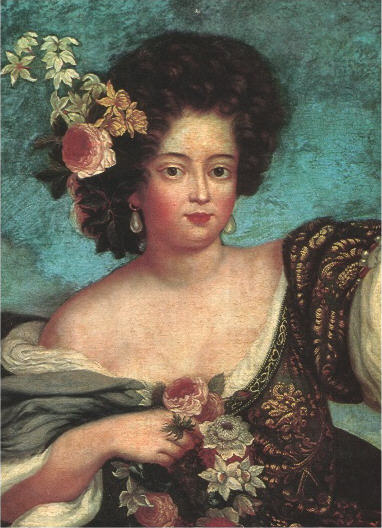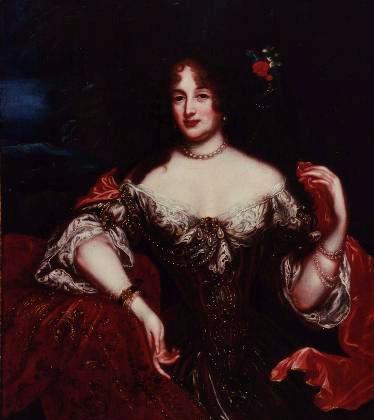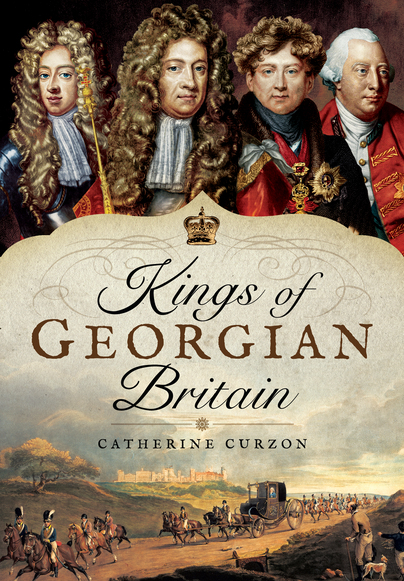Catherine Curzon is a royal historian who writes on all matters 18th century at www.madamegilflurt.com. Her work has been featured on HistoryExtra.com, the official website of BBC History Magazine and in publications such as Explore History, All About History, History of Royals and Jane Austen’s Regency World. She has provided additional research for An Evening with Jane Austen at the V&A and spoken at venues including the Royal Pavilion in Brighton, Lichfield Guildhall, the National Maritime Museum and Dr Johnson’s House. Catherine holds a Master’s degree in Film and when not dodging the furies of the guillotine, she lives in Yorkshire atop a ludicrously steep hill. Read about Catherine’s exciting new book, The Kings of Georgian Britain, below.
You can follow Catherine on social media: Facebook, Twitter, Google Plus, Pinterest and Instagram
Read about Catherine’s exciting new book, The Kings of Georgian Britain, below.
We welcome Catherine, who has graciously provided this story of Clara von Platten, a ruthless player at the Hanoverian court, to our humble abode. Now read on…
The man who would one day reign as King George I and his wife, Sophia Dorothea of Celle, did not get on. They were cousins forced into an arranged marriage that neither wanted and from the first day they met, it was clear that their union would not be happy one. Sophia Dorothea fainted at the sight of her fiancé whilst George sidelined her in favour of his mistresses and, when she complained, attempted to throttle her. It’s hardly surprising, therefore, that Sophia Dorothea fought fire with fire and took a lover, throwing in her lot with Count Philip Christoph von Königsmarck, a Swedish soldier who had been a treasured childhood friend.

Sophie Dorothea Princess-of Hanover by Henry Gascard
The couple exchanged heated love letters and soon they were the talk of the court. Königsmarck was a libertine though, and when he enjoyed a short liaison with Countess Clara von Platen, it was to prove a fatal mistake. Clara, influential, spiteful and feared by her fellow courtiers, was the long-time mistress of George’s father, Ernest Augustus, and she liked nothing so much as trouble. When Königsmarck rejected Clara in favour of Sophia Dorothea, hell truly had no fury like her. She knew better than to show her anger though and instead bided her time, gathering evidence, smiling sweetly at Sophia Dorothea and waiting for the moment to strike.

Philipp Christoph von Königsmarck (unknown artist)
That moment came when Sophia Dorothea and Königsmarck hatched a plan to flee Hanover forever and begin life anew in Wolfenbüttel. On the eve of their flight, Königsmarck received a note purporting to be from his lover that summoned him to her chambers. He obeyed, heading straight to Sophia Dorothea’s rooms and providing whoever had penned the note with the evidence they needed that the two were indeed a couple.
Faced with the proof that his daughter-in-law was betraying her husband, Ernest Augustus agreed that Königsmarck should be arrested and Clara, in the company of four courtiers, went along, supposedly to ensure that he was. In fact, Clara had no intention that Königsmarck would leave the Leineschloss alive.

Clara Elisabeth von Platen
When he left his lover’s rooms, Königsmarck found the door he usually used locked and it was then that the four men attacked him. The count stood no chance against his assailants and was soon subdued. Grievously injured by a blow to the head, he summoned the breath to beg for the life of the princess before losing consciousness. The insensible soldier was dragged into the presence of the countess as he regained his senses. Seeing who had masterminded his fate, he swore a bitter oath. Clara’s reply was to kick Königsmarck hard in the face and it was the last thing he ever knew; moments later, he was dead.
Many versions of Königsmarck’s fate exist, but all involve Clara, and her rumoured involvement in his disappearance followed her to the grave. What became of Königsmarck’s body, however, remains a mystery.
Perhaps Clara and her comrades fell into a panic once the cold truth of their deeds sank in. After all, the elector had given his permission for her to have Königsmarck arrested, not killed, and the future for the courtiers involved might be very bleak indeed if Ernest Augustus discovered what they had done. In Memoirs of Sophia Dorothea, Consort of George I, the corpse is concealed beneath quicklime, whilst Horace Walpole suggested that he was strangled, his body hidden beneath the floorboards of the Leineschloss and still more have suggested that it was hurled into the river Leine or even burned on a bonfire.
We will never know for sure what became of Königsmarck, and the victim and killers took the secret to their respective graves if, indeed, Königsmarck even had a grave to call his own.
Bibliography
Belsham, W. Memoirs of the Kings of Great Britain of the House of Brunswic-Luneburg, Vol I. London: C Dilly, 1793.
Belsham, William. Memoirs of the Reign of George III to the Session of Parliament Ending AD 1793, Vol III. London: GG and J Robinson, 1801.
Benjamin, Lewis Saul. The First George in Hanover and England, Volume I. London: Charles Scribner’s Sons, 1909.
Black, Jeremy. The Hanoverians: The History of a Dynasty. London: Hambledon and London, 2007.
Hatton, Ragnhild. George I. London: Thames and Hudson. 1978.
Morand, Paul. The Captive Princess: Sophia Dorothea of Celle. Florida: American Heritage Press, 1972.
Ward, Adolphus William. The Electress Sophia and Hanoverian Succession. London: Longmans, Green and Co, 1909.
Wilkins, William Henry. The Love of an Uncrowned Queen. London: Hutchinson & Co, 1900.
Wilkins, William Henry. A Queen of Tears. London: Longmans, Green & Co, 1904.
Williams, Robert Folkestone. Memoirs of Sophia Dorothea, Consort of George I, Vol I. London: Henry Colburn, 1845.
Williams, Robert Folkestone. Memoirs of Sophia Dorothea, Consort of George I, Vol II. London: Henry Colburn, 1845.
 The Kings of Georgian Britain
The Kings of Georgian Britain
For over a century of turmoil, upheaval and scandal, Great Britain was a Georgian land.
From the day the German-speaking George I stepped off the boat from Hanover, to the night that George IV, bloated and diseased, breathed his last at Windsor, the four kings presided over a changing nation.
Kings of Georgian Britain offers a fresh perspective on the lives of the four Georges and the events that shaped their characters and reigns. From love affairs to family feuds, political wrangling and beyond, peer behind the pomp and follow these iconic figures from cradle to grave. After all, being a king isn’t always grand parties and jaw-dropping jewels, and sometimes following in a father’s footsteps can be the hardest job around.
Take a trip back in time to meet the wives, mistresses, friends and foes of the men who shaped the nation, and find out what really went on behind closed palace doors. Whether dodging assassins, marrying for money, digging up their ancestors or sparking domestic disputes that echoed down the generations, the kings of Georgian Britain were never short on drama.
Available from
Pen & Sword, Amazon UK, Amazon US

Leave a Reply